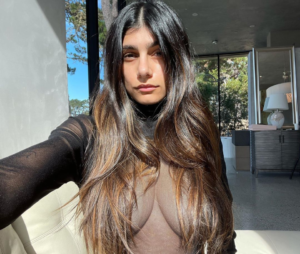
Mia Khalifa is a well-known media personality who became famous for her brief stint in the adult entertainment industry. Born on February 10, 1993, in Beirut, Lebanon, Mia Khalifa’s background and her life experiences leading up to her fame are characterized by dramatic cultural shifts and unique personal challenges.

Mia’s family emigrated from Lebanon to the United States in 2001, when she was around eight years old, seeking safety and stability amid the Lebanese Civil War and general unrest in the Middle East. They initially settled in Montgomery County, Maryland, where Mia attended school. Moving to a Western country introduced her to a different cultural framework than she was used to. Growing up in a strict Lebanese Catholic family, Mia was instilled with a set of conservative values, which contrasted sharply with the more liberal environment she encountered in America. The cultural shift she experienced at a young age had a lasting effect on her, shaping her personality and decisions in complex ways.

As a child in America, Mia often faced challenges fitting in due to cultural differences and her Middle Eastern heritage. She has spoken about the alienation she felt during this period, and how she struggled to find her identity in a new society that didn’t always understand or accept her background. Over time, however, she adapted to her surroundings, and eventually attended Northwest High School in Germantown, Maryland. After graduating high school, she went on to attend the University of Texas at El Paso (UTEP), where she pursued a degree in History.

During her time in college, Mia worked in various part-time jobs, including at a fast-food restaurant. Despite leading a relatively normal life, Mia faced insecurities about her body image and appearance, which influenced her later decisions in adulthood.

Mia Khalifa’s entry into the adult industry occurred in 2014, when she was only 21 years old. She joined the industry after being approached by a man at a fast-food restaurant where she was working at the time. Her decision was impulsive, influenced by a desire to break out of her comfort zone, explore her independence, and push back against societal and familial expectations. However, Mia was largely unprepared for the consequences of her actions. In a short period, her videos became immensely popular, with one controversial video in which she wore a hijab sparking international outrage. While it was meant to be satirical, the video offended a significant number of people, especially in the Middle East, and she received intense backlash, including death threats from extremist groups. Her popularity skyrocketed as a result of this controversy, and within months, she became the most-searched performer on one of the largest adult content websites.

However, Mia’s experience in the industry was brief; she retired after only three months and filmed around a dozen videos. She has since expressed regret over her decision to enter the industry and has been candid about the impact it has had on her life, both personally and professionally. In various interviews, Mia has shared how she faced severe backlash not only from her community but also from her family. Her parents distanced themselves from her, and she lost friendships and support systems as a result of the stigma surrounding her past. Mia’s Lebanese background played a significant role in the backlash she received, as the adult industry is heavily stigmatized in conservative Middle Eastern societies. The cultural and familial repercussions of her career choice were, in many ways, more difficult for her to handle than the online harassment she endured.

In the years following her retirement, Mia Khalifa made several attempts to distance herself from her past in the adult industry. She has used her platform to openly criticize the industry, highlighting issues related to consent, exploitation, and the lack of control performers have over their content. Mia has shared that despite leaving the industry, the videos she appeared in remain online, and she has little to no control over how her image is used. She has been a vocal advocate for the rights of adult film performers, calling for greater transparency and protections for those in the industry. Her openness has sparked important conversations about exploitation and informed consent in adult entertainment.

Aside from her advocacy, Mia has also worked to rebuild her personal and professional life. She shifted her focus to social media and content creation, where she developed a strong following on platforms like Instagram, Twitter, and TikTok. Her posts cover a wide range of topics, from humor and lifestyle content to more serious discussions on her personal struggles, mental health, and her experience dealing with cyberbullying. Mia has also dabbled in sports commentary and streaming, which has allowed her to explore new interests and gain a more positive public image. Her love for sports, particularly hockey, has been a consistent theme in her content, and she has collaborated with sports outlets on various occasions. Through these new ventures, Mia has worked to redefine herself beyond her past, and she has successfully cultivated a loyal fanbase that respects her for her resilience and transparency.

Mia Khalifa’s journey has been marked by resilience in the face of public scrutiny and personal trauma. Despite her challenges, she has remained determined to reclaim her narrative and establish herself as more than her past. She has shared that dealing with the repercussions of her brief stint in the adult industry has been an ongoing battle, and her experience has shed light on the complexities and consequences of personal choices in the digital age. The internet has made it difficult for her to fully move on from her past, as images and videos are constantly recirculated. This struggle has influenced her perspective on digital rights and privacy, and she has spoken about the need for stricter regulations to protect people from lifelong consequences stemming from content shared online.

Over time, Mia has received support from individuals who admire her strength and honesty. She has found solidarity with people who have faced similar challenges and has expressed gratitude to those who have shown her kindness and empathy. Mia’s story is one of navigating complex cultural expectations, facing severe public backlash, and attempting to rebuild one’s life after a difficult chapter. Through her social media presence, she has fostered an open dialogue about forgiveness, growth, and the importance of not defining a person by their past choices.

In recent years, Mia Khalifa has continued to use her platform to advocate for self-empowerment and personal growth. Her journey underscores the importance of resilience and highlights the social and cultural pressures that can lead individuals to make choices they later regret. Her life story serves as a cautionary tale about the lasting impact of online content and the need for society to address issues of exploitation, informed consent, and the right to personal reinvention. Mia Khalifa’s background and experiences reflect the broader struggle many people face in reclaiming their narratives in an increasingly digital world, where personal history can be both inescapable and a source of empowerment.




